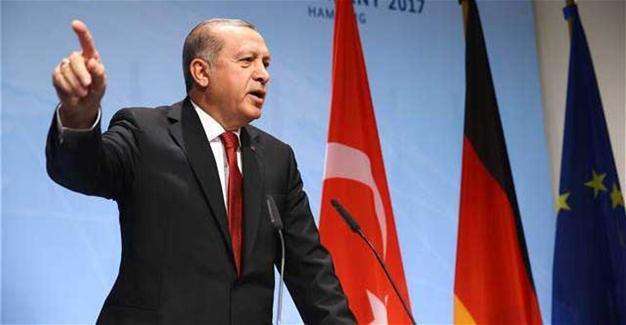Turkey ‘will not ratify Paris climate accord’
HAMBURG
 President Recep Tayyip Erdoğan said on July 8 that Turkey would not ratify the Paris climate accord, speaking at the end of the G-20 summit in Germany.
President Recep Tayyip Erdoğan said on July 8 that Turkey would not ratify the Paris climate accord, speaking at the end of the G-20 summit in Germany.“After that step taken by America, the position that we adopt is in the direction of not passing it in parliament,” Erdoğan said at a press conference in Hamburg.
The summit of the world’s biggest industrialized and developing economies agreed that 19 of its members would stick with the 2015 plan to fight global warming and “took note” of U. S. President Donald Trump’s pullout from the initiative.
But shortly after the mega-summit ended, Erdoğan, who met Trump at the event, told a news conference that Turkey was no longer a certain candidate and suggested other members of the “G19” also had doubts.
He said he had clearly told French President Emmanuel Macron and German Chancellor Angela Merkel: “No offence, but we will not pass it in our parliament as long as the promises made to us are not delivered.”
He said former French president Francois Hollande had promised him that Turkey would be classed as a developing and not an industrialized economy - meaning Ankara would receive money from a global climate fund rather than have to pay into it.
He also suggested some other, unidentified, countries had a “problem” with the agreement and said “they are not renewing their full support.”
World leaders made concessions on trade and climate language to Donald Trump on July 8 at the end of the riot-hit G-20 summit, in exchange for preserving a fragile unity of the club.
In one of the weekend’s more bizarre scenes, Trump raised eyebrows by leaving a discussion and letting his daughter Ivanka take his place.
In a departure from final summit declarations that tend to outline consensus on issues that range from fighting terrorism to financial governance, the extraordinary conclusion this year spelt out differences on core issues.
It acknowledged Trump’s decision to take the United States out of the 2015 Paris deal and clearly stated Washington’s wish to continue using and selling fossil fuels that are a main driver of global warming.
The declaration also stated for the first time the right of countries to protect their markets with “legitimate trade defense instruments” - wording that essentially gives Trump wiggle room to push on with his “America First” policy.
The nationalistic stance has set him on collision course with many of America’s allies, who warned Trump against an isolationist path and starting a trade war.
“Where there is no consensus, the communique spelt out the discord,” said host Chancellor Angela Merkel.
Thomas Bernes from the think-tank Centre for International Governance Innovation described the final declaration as a “masquerade.”
“When compared to the G-20 dynamic since the London summit in 2009, it’s a step back: a clear signal against protectionism to fight the financial crisis becomes a mixed signal.”
If the meetings within the tightly secured venue were anything but harmonious, outside chaos and violence gripped Germany’s second city.
The clashes between the security forces and the protesters, meanwhile, blocked U.S. First Lady Melania Trump at her residence on July 7, forcing G-20 organizers to completely alter a programme for spouses of visiting leaders.
On July 8, thousands of anti-riot cops were again on guard, as helicopters hovered overhead, with tens of thousands of demonstrators on the march.
Fresh clashes erupted on July 9 in the streets of Hamburg following the end of the G-20 summit, with protesters setting fire to a number of vehicles and police reporting more officers injured and more arrests.
Within the summit walls, world leaders were dancing a delicate diplomatic waltz, with discord not only dogging the main G-20 conferences, but also adding tension to bilateral asides.
Host Merkel herself admitted that “deep differences” remain with Erdogan after they met on the sidelines of the summit.
But it was Trump’s first head-to-head with Russia’s leader President Vladimir Putin that stole the show.
















